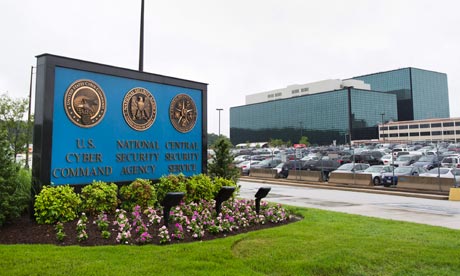World Class

James Robertson breaks ranks and says he was shocked to hear of changes to allow broader authorisation of NSA programs

The Fisa courts, set
up under the Foreign Intelligence Surveillance Act, are intended to
provide legal oversight. Photograph: Jim Lo Scalzo/EPA
A former federal judge who granted government surveillance
requests has broken ranks to criticise the system of secret courts as
unfit for purpose in the wake of recent revelations by NSA whistleblower Edward Snowden.
James Robertson, who retired from the District of Columbia circuit in 2010, was one of a select group of judges who presided over the so-called Fisa courts, set up under the Foreign Intelligence Surveillance Act, which are intended to provide legal oversight and protect against unnecessary privacy intrusions.
But he says he was shocked to hear of recent changes to allow more sweeping authorisations of programmes such as the gathering of US phone records, and called for a reform of the system to allow counter-arguments to be heard.
Speaking as a witness during the first public hearings into the Snowden revelations, Judge Robertson said that without an adversarial debate the courts should not be expected to create a secret body of law that authorised such broad surveillance programmes.
"A judge has to hear both sides of a case before deciding," he told members of a Privacy and Civil Liberties Oversight Board (PCLOB) recently appointed by President Obama.
"What Fisa does is not adjudication, but approval. This works just fine when it deals with individual applications for warrants, but the 2008 amendment has turned the Fisa court into administrative agency making rules for others to follow."
"It is not the bailiwick of judges to make policy," he added.
The comments, during the morning session of a PCLOB public workshop held in a Washington hotel, are the most serious criticism yet from a recently serving Fisa judge.
Until now, Fisa judges have mainly spoken anonymously to defend the court process.
Robertson says he was generally impressed with how "careful, fastidious and scrupulous" the court process had been, but felt the so-called ex parte system (where only the government is able to make its case to the judge) needed urgent reform.
"This process needs an adversary. If it's not the ACLU or Amnesty, perhaps the PCLOB can be that adversary."
Members of the oversight board, which has previously been criticised by Congress as an ineffective watchdog, shook their heads and rolled their eyes when this suggestion was made.
The workshop continues on Tuesday afternoon, and the board is expected to make recommendations in a report to the president.
James Robertson, who retired from the District of Columbia circuit in 2010, was one of a select group of judges who presided over the so-called Fisa courts, set up under the Foreign Intelligence Surveillance Act, which are intended to provide legal oversight and protect against unnecessary privacy intrusions.
But he says he was shocked to hear of recent changes to allow more sweeping authorisations of programmes such as the gathering of US phone records, and called for a reform of the system to allow counter-arguments to be heard.
Speaking as a witness during the first public hearings into the Snowden revelations, Judge Robertson said that without an adversarial debate the courts should not be expected to create a secret body of law that authorised such broad surveillance programmes.
"A judge has to hear both sides of a case before deciding," he told members of a Privacy and Civil Liberties Oversight Board (PCLOB) recently appointed by President Obama.
"What Fisa does is not adjudication, but approval. This works just fine when it deals with individual applications for warrants, but the 2008 amendment has turned the Fisa court into administrative agency making rules for others to follow."
"It is not the bailiwick of judges to make policy," he added.
The comments, during the morning session of a PCLOB public workshop held in a Washington hotel, are the most serious criticism yet from a recently serving Fisa judge.
Until now, Fisa judges have mainly spoken anonymously to defend the court process.
Robertson says he was generally impressed with how "careful, fastidious and scrupulous" the court process had been, but felt the so-called ex parte system (where only the government is able to make its case to the judge) needed urgent reform.
"This process needs an adversary. If it's not the ACLU or Amnesty, perhaps the PCLOB can be that adversary."
Members of the oversight board, which has previously been criticised by Congress as an ineffective watchdog, shook their heads and rolled their eyes when this suggestion was made.
The workshop continues on Tuesday afternoon, and the board is expected to make recommendations in a report to the president.
No comments:
Post a Comment
Thanks for your comment, keep reading our news and articles